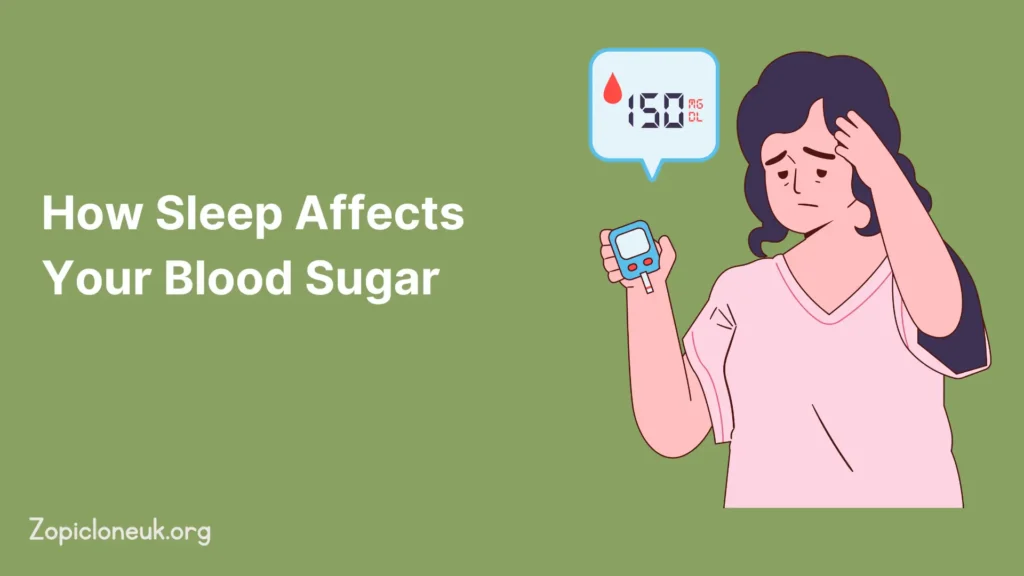
Sleep Affects Blood Sugar:- Sleep is a fundamental aspect of human health, influencing various physiological functions, including blood sugar regulation. The connection between sleep and blood sugar levels is a topic of growing interest, especially as the prevalence of diabetes continues to rise globally. Understanding how sleep affects blood sugar can offer valuable insights into managing diabetes and maintaining overall health.
Contents
The Science of Sleep and Blood Sugar
Understanding the connection between sleep and blood sugar involves examining several key mechanisms:
-
Hormonal Regulation:
- Insulin: Sleep influences insulin sensitivity. Poor sleep can reduce the body’s ability to use insulin effectively, leading to higher blood sugar levels.
- Cortisol: Lack of sleep increases cortisol levels, a hormone that raises blood sugar. High cortisol levels are often observed in individuals experiencing chronic sleep deprivation.
-
Circadian Rhythms:
- The body’s internal clock, or circadian rhythm, plays a significant role in glucose metabolism. Disruption in sleep patterns can lead to misalignment of this rhythm, affecting how the body processes glucose.
-
Appetite and Cravings:
- Sleep deprivation alters the balance of hunger hormones, such as ghrelin and leptin, increasing appetite and cravings for high-carbohydrate foods, which can spike blood sugar levels.
Impact of Poor Sleep on Blood Sugar
Short-Term Effects
- Immediate Spikes: Even one night of poor sleep can lead to elevated blood sugar levels the following day.
- Impaired Glucose Tolerance: Reduced sleep can temporarily impair the body’s ability to tolerate glucose, similar to what is seen in pre-diabetic conditions.
Read Also:- Sleep and Blood Glucose Levels
Long-Term Effects
- Increased Risk of Type 2 Diabetes: Chronic sleep deprivation is associated with a higher risk of developing type 2 diabetes due to sustained high blood sugar levels and insulin resistance.
- Weight Gain and Obesity: Poor sleep is linked to weight gain, a significant risk factor for diabetes. Sleep influences appetite regulation, leading to overeating and weight gain, which can exacerbate blood sugar problems.
Tips for Optimizing Sleep to Control Blood Sugar
-
Maintain a Regular Sleep Schedule:
- Go to bed and wake up at the same time every day to regulate your body’s internal clock.
-
Create a Sleep-Conducive Environment:
- Keep your bedroom cool, dark, and quiet. Use blackout curtains and earplugs if necessary.
-
Limit Screen Time Before Bed:
- Reduce exposure to blue light from phones, tablets, and computers at least an hour before bedtime.
-
Watch Your Diet:
- Avoid heavy meals, caffeine, and alcohol close to bedtime. Opt for a light, balanced snack if you’re hungry before sleep.
-
Exercise Regularly:
- Engage in regular physical activity, but avoid vigorous exercise close to bedtime.
Extra Tips for Better Sleep
- Practice Relaxation Techniques: Activities such as meditation, deep breathing, and progressive muscle relaxation can help calm the mind and prepare the body for sleep.
- Establish a Bedtime Routine: Develop a calming pre-sleep routine, such as reading a book, taking a warm bath, or listening to soothing music.
- Monitor Blood Sugar Levels: Keeping track of your blood sugar levels can help you understand how different sleep patterns affect your glucose metabolism.
Additional Information
- Sleep Hygiene: Adopting good sleep hygiene practices is crucial for maintaining consistent, high-quality sleep.
- Sleep Disorders: Conditions like sleep apnea can significantly impact blood sugar control and should be addressed with professional help.
- Lifestyle Factors: Stress management, balanced nutrition, and regular physical activity are integral to both sleep quality and blood sugar regulation.
FAQs
Q1: How does sleep deprivation affect blood sugar levels?
- Sleep deprivation can impair insulin sensitivity and increase cortisol levels, leading to higher blood sugar levels. It also affects hunger hormones, causing increased appetite and cravings for high-carb foods.
Q2: Can improving sleep help manage diabetes?
- Yes, improving sleep quality and duration can enhance insulin sensitivity and glucose metabolism, making it easier to manage blood sugar levels and control diabetes.
Q3: What are some tips for better sleep?
- Maintaining a regular sleep schedule, creating a sleep-friendly environment, limiting screen time, and practicing relaxation techniques are some effective strategies for improving sleep quality.
Q4: How much sleep is recommended for optimal blood sugar control?
- Most adults need between 7-9 hours of sleep per night for optimal health and blood sugar control.
Q5: Can napping help regulate blood sugar?
- Short naps (20-30 minutes) can be beneficial for reducing sleep debt and improving overall alertness, but long naps may disrupt nighttime sleep patterns and should be avoided.
Conclusion
Sleep plays a crucial role in regulating blood sugar levels and maintaining overall health. Poor sleep can lead to insulin resistance, hormonal imbalances, and impaired glucose metabolism, all of which can elevate blood sugar levels and increase the risk of diabetes. For individuals with diabetes, quality sleep is essential for effective blood sugar management and medication efficacy. By establishing a consistent sleep routine, optimizing the sleep environment, and making lifestyle changes, you can improve your sleep quality and support healthy blood sugar levels.
Zopiclone, a medication often prescribed for sleep disorders, can be a helpful tool for those struggling with sleep issues. However, it is important to use Zopiclone under the guidance of a healthcare professional to ensure its safe and effective use. Always consult with your doctor before starting or adjusting any medication.
Author Details




Medical content by qualified psychiatrists
Our editorial policy

Zopiclone precautions Read our potential abuse notice

Looking for a seller? Locate the best Zopiclone vendor






